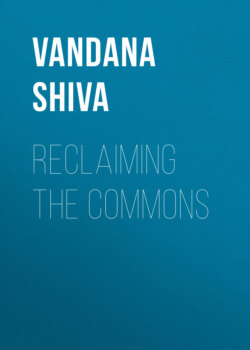Читать книгу Reclaiming the Commons - Vandana Shiva - Страница 20
На сайте Литреса книга снята с продажи.
Why has documentation of community knowledge become necessary?
ОглавлениеDocumentation of community knowledge is becoming imperative because of:
•Erosion of resources: non-sustainable production and consumption patterns in agriculture have led to the erosion of land, water and agricultural biodiversity in farmers’ fields. For example, the ‘miracle seeds’ of the green revolution replaced indigenous varieties of rice, many of which are like amaranth–and in the process of being replaced by crops like rice and wheat–are also threatened by extinction.
•Erosion of knowledge: communities which are identified and innovated have traditionally had free exchange of knowledge of their resources within the community and outside it. When such resources are eroded and lack common use, common knowledge is eroded over time.
•Disappearance of sustainable utilization alternatives: when both the resource and knowledge about it disappear from the commons, the space for utilization of alternatives in a sustainable manner, or rather, the space for a return to sustainable agricultural production and consumption shrinks.
•Intellectual piracy: the removal of knowledge from the commons leaves it vulnerable to being claimed as the private intellectual property of someone else. This is particularly true when the common knowledge has no recorded originator or innovator but has traditionally been treated as community knowledge. The IPR regimes ensure that the pirates of such knowledge become the new owners of the knowledge and share it only for profits.
•Biopiracy: intimately linked with intellectual piracy is biopiracy. The removal of resources from the commons leaves it vulnerable to piracy both directly by the IPR regimes and by collections made by organizations (nationally and internationally, government or private).
•IPRs and monopolies: together, intellectual piracy and biopiracy mean that the resource is now in the monopoly control of corporations. In agriculture, this reduces all innovation to innovation by the corporations for profits, with agricultural production and consumption becoming conditional on corporate interests.
* Those who practice Ayurveda are known as Vaids
* In India, Hakims are those who practice Unani
